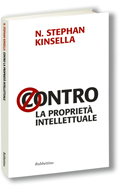Mimi & Eunice: Stealing Labor
IP Law, Mimi & Eunice on IPThis is a syndicated post, which originally appeared at Mimi and Eunice » IP. View original post.
Mimi & Eunice: Stealing Labor Read Post »
This is a syndicated post, which originally appeared at Mimi and Eunice » IP. View original post.
Mimi & Eunice: Stealing Labor Read Post »
Based on a famous quote from Tim O’Reilly. Because Mimi & Eunice are Free and Copyleft and ShareAlike and want to be copied, “piracy” poses no threat to them at all. But very few people know they exist. Please copy, embed, etc. – the more they’re copied, the less obscure they’ll become.
Also, you can buy the book.
~*~
This is a syndicated post, which originally appeared at Mimi and Eunice » IP. View original post.
Mimi & Eunice: Obscurity Read Post »
 An Italian translation of my Against Intellectual Property was recently published: Contro La Proprietà Intellettuale (edited, translated, and with a preface by Roberta Modugno; Soveria Mannelli: Rubbettino Editore, Nov. 2010).
An Italian translation of my Against Intellectual Property was recently published: Contro La Proprietà Intellettuale (edited, translated, and with a preface by Roberta Modugno; Soveria Mannelli: Rubbettino Editore, Nov. 2010).
Also, the Italian translation of my “What Libertarianism Is” will be included in “Parte Terza: Diritto Naturale e Teoria Politica,” of the forthcoming L’Anarcocapitalismo: Epistemologia, Economia e Teoria Politica [Anarcho-Capitalism: Epistemology, Economics and Political Theory], part of the Nuova Civiltà delle Macchine monograph series edited by Dario Antiseri (one of the major living Italian philosophers). I was asked to prepare an abstract of this piece for the book, which is:
Concepts and ideas such as individual rights, property rights, the free market, capitalism, justice, and the nonaggression principle are not defining characteristics of libertarianism for various reasons–most of them are based on property rights. All political philosophies have some view of property rights; what is distinctive about libertarianism is its particular property assignment rules. This article describes libertarianism’s particular property assignment rules in two cases: for human bodies, the rule is “self-ownership”; in the case of external scarce resources, the property assignment rule is based on Lockean homesteading principles). The article explores how and why these libertarian property assignment rules arise from and are related to the purpose of property rights, which is to permit conflict-free use of scarce resources. The libertarian view is that self-ownership and Lockean homesteading of external resources are the only property assignment rules compatible with more basic grundorms (basic norms of civilized men) such as justice, peace, prosperity, cooperation, and conflict-avoidance, which are adopted in part because of empathy. The article agues that civilized man may be defined as he who seeks justification for the use of interpersonal violence. A consistent application of the basic civilized grundnorms shows that only the libertarian norms, and its non-aggression principle, can be justified. Thus, libertarianism may be said to be the political philosophy that consistently favors social rules aimed at promoting peace, prosperity, and cooperation. It holds that the only rules that satisfy the civilized grundnorms are the self-ownership principle and the Lockean homesteading principle, applied as consistently as possible.
(Other translations of my writings are collected here.)
Kinsella in Italian Read Post »
Geoffrey recently warned of the perils of centralized innovation. In contradistinction to that very warning, I came across this footnote (chapter 14, footnote 3) in Friedrich A. Hayek’s famous ‘The Road to Serfdom‘:
The case of the alleged suppression of useful patents is more complicated and cannot be adequately discussed in a note; but the conditions in which it would be profitable to put into cold storage a patent which in the social interest ought to be used are so exceptional that it is more than doubtful whether this has happened in any important instance. [emphasis in original]
In Hayek’s favor, there was no internet or WikiLeaks back then (but then again, perhaps that was AT&T’s fault!)
Blinded by Science Read Post »
I and some friends are trying to compile a list of various notable musicians, artists, and the like who are more or less good on copyright, and those who are particularly bad. For “good” we mean they explicitly oppose copyright or at least fight for their fans and against some of the excesses of draconian copyright. For the bad, we mean those who use the power of the state to attack their fans and/or hypocrites who pretend to be for peace and love and condemn capitalism and commercialism while greedily condoning the use of state copyright law to persecute innocent people. I’ll list a few on both sides below; other suggestions or comments are welcome as are any links documenting the good/bad IP status of individuals listed below; I’ll update this list from time to time.
Good Guys and Bad Guys in the Media Biz Read Post »